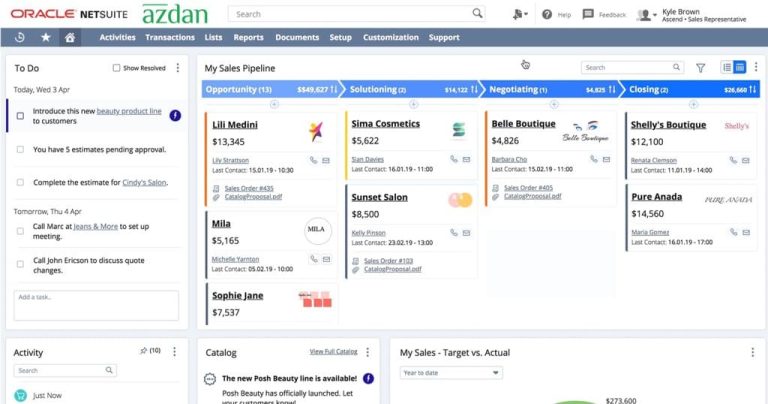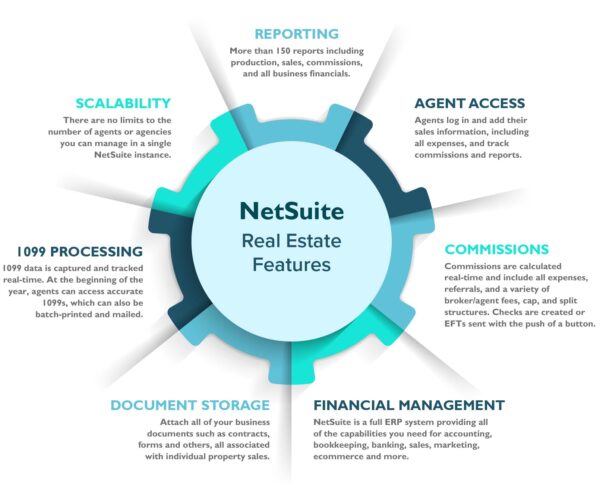
NetSuite For Property Management Industry
In today’s rapidly evolving real estate landscape, property management companies are facing increasing pressure to optimize their operations, improve efficiency, and deliver exceptional service to tenants. The complexities of managing properties, tenants, contracts, and finances can be overwhelming without the right tools and technology. That’s where NetSuite for property management comes into play.
NetSuite is a cloud-based enterprise resource planning (ERP) solution that offers a comprehensive suite of features designed specifically for the real estate industry. By leveraging NetSuite’s powerful capabilities, property managers can streamline their workflows, enhance decision-making, and gain a competitive edge in the market.
NetSuite for property management provides a unified platform that integrates various aspects of property management operations, including project management, contract management, financial accounting, and tenant relationship management. This integration eliminates the need for multiple, disconnected systems and ensures a seamless flow of information across the organization.
In this blog post, we will explore the key features and benefits of NetSuite for property management. We will delve into how NetSuite can help property managers:
Take advantage of a modern ERP solution: NetSuite for Property Management
NetSuite for Property Management offers a comprehensive solution for managing all aspects of your real estate operations. From property sales and leasing to community management, utility management, and facility maintenance, NetSuite provides the tools you need to streamline your workflows, improve efficiency, and enhance tenant satisfaction.

1. Property Sales
- Streamline the property sales process: Manage property listings, track leads, and close deals efficiently with NetSuite’s property sales features.
- Generate professional marketing materials: Create high-quality marketing materials to attract potential buyers.
- Integrate with CRM systems: Seamlessly connect NetSuite with your CRM system for better lead management and customer relationship management.
2. Property Leasing
- Simplify property leasing and tenant management: Manage lease agreements, track rental payments, and handle tenant requests efficiently.
- Automate lease renewals: Streamline the lease renewal process and reduce administrative burden.
- Integrate with accounting systems: Ensure accurate financial tracking by integrating NetSuite with your accounting system.
3. Community Management
- Enhance community engagement and satisfaction: Manage resident communications, events, and amenities to foster a positive community atmosphere.
- Track maintenance requests: Efficiently manage and track maintenance requests to ensure timely resolution.
- Improve community safety and security: Implement security measures and track safety incidents to create a safe and secure living environment.
4. Utility Management
- Efficiently manage utility billing and consumption: Track utility usage for individual units and properties to optimize billing and consumption.
- Generate accurate utility bills: Create and send accurate utility bills to tenants.
- Integrate with utility providers: Automate billing processes by integrating with utility providers.
5. Facility Management
- Optimize facility maintenance and operations: Create and manage work orders, track maintenance tasks, and schedule inspections to ensure efficient facility management.
- Manage vendor contracts and invoices: Streamline vendor management and invoicing processes.
- Ensure compliance with safety regulations and building codes: Maintain compliance with relevant safety regulations and building codes.
Modules of NetSuite for Property Management
1. NetSuite's Project Management module
NetSuite’s Project Management module offers a comprehensive solution for planning, executing, and tracking projects within the real estate industry. Key features include:
- Project Planning: Create detailed project plans, setting milestones, and defining project timelines.
- Project Tracking: Monitor project progress in real-time, track project status, and assign ownership.
- Contract Management: Manage vendor contracts, including payment terms, tax information, and budget allocations.
- Cost Management: Define project costs, track expenses, and calculate distribution amounts.
- Payment Management: Issue payments based on project completion and track progress payments.
- Project Documentation: Create checklists and other documentation for project phases.
- Contract Amendments: Modify existing contracts to address changes in scope or timeline.
- Communication: Collaborate effectively with team members and stakeholders using notes, files, and notifications.
- Budget Management: Create and manage project budgets, track expenses, and reallocate funds as needed.
- BOQ Management: Manage bill of quantities (BOQs) for projects, including budget, contract, and progress payment BOQs.
- Resource Management: Assign team members to specific project roles and track their contributions.
By leveraging NetSuite’s Project Management module, real estate professionals can streamline their project workflows, improve efficiency, and deliver projects on time and within budget.
2. Property Sales Management Module
NetSuite’s Property Sales Management module provides a comprehensive solution for managing properties, units, and the sales process. Key features include:
- Unit Master: Track properties and units for sale, including status, details, area information, location information, sales information, amenities, and features.
- CRM Integration: Manage customer interactions, follow-ups, and sales opportunities with a fully integrated CRM system.
- Sales Offers: Create sales offers documents for clients, including unit details, pricing information, and payment plan summaries.
- Sales Contracts: Generate sales contracts (Sales and Purchase Agreements) from reservations, including all reservation details.
- Payment Management: Support various payment methods, including cash, wire transfer, card payment, check, and customer PDCs.
- Payment Plan Tracking: Track payment schedules, receive payments, and send reminders for pending payments.
- Property Hierarchy: Set up a hierarchy for properties, buildings, floors, and units.
- Sales and Marketing Automation: Automate lead generation and conduct targeted marketing campaigns.
- Reservation Management: Manage the reservation process, from creating reservations to issuing reservation documents.
- Payment Plan Generation: Create and manage customized payment plans for units, including milestones, dates, amounts, and remaining balances.
By leveraging NetSuite’s Property Sales Management module, real estate professionals can streamline the sales process, manage properties and units effectively, and enhance customer relationships.
3. Property Lease Management Module
NetSuite’s Property Lease Management module provides a comprehensive solution for managing properties, units, and the leasing process. Key features include:
- Property Hierarchy: Set up a hierarchy for properties, buildings, floors, and units.
- Tenant Management: Manage tenant profiles and communication, from lead to tenant.
- Sales and Marketing Automation: Automate lead generation and conduct targeted marketing campaigns.
- Property Management: Manage owned or third-party landlord units for the leasing process.
- Tenancy Contract Management: Automate and manage the entire lifecycle of leasing contracts, including creation, termination, unit information, dates, terms and conditions, service charge rates, and the ability to create tenancy contracts for single or multiple units.
- Lease Charge: Define the billing schedule according to the tenancy contract and automate billing.
- Payment Tracking: Track all lease-related payments, including rent, security deposits, and late payment fees.
- Lease Renewal: Automate alerts for lease renewal proposals and track tenant contract renewal history.
- Lease Compliance: Ensure compliance with regulatory and internal company requirements.
By leveraging NetSuite’s Property Lease Management module, real estate professionals can streamline the leasing process, manage properties and units effectively, and enhance tenant relationships.
NetSuite for Property Management Features
NetSuite for Property Management offers a comprehensive solution for managing properties, units, and tenants. With its user-friendly interface and powerful features, NetSuite empowers real estate businesses to streamline operations, improve efficiency, and enhance tenant satisfaction.

Comprehensive Dashboards
NetSuite for Property Management offers a suite of powerful dashboards that provide real-time insights into your property management operations. These dashboards offer a variety of visualizations, including trend graphs, lists, and analytics, to help you monitor key performance indicators.
Specific dashboards for property management include:
- Property Occupancy Ratio Status: Track the occupancy rates of your properties.
- Pending Tenant Requests: Monitor incoming tenant inquiries and applications.
- Lease Agreement Status: Manage the status of lease agreements.
- Lease Settlement Status: Track the progress of lease settlements.
Property Creation
NetSuite for Property Management allows you to easily create and manage properties and units within the system. When creating properties and units, you can:
- Define address: Specify the property’s location.
- Define property type: Indicate the type of property (e.g., residential, commercial).
- Attach pictures: Add photos of the property.
- Define owner agreements: Specify the terms and conditions of the property ownership.
- Define individual unit features: Specify the intended purpose, property type, regulatory information, and other relevant features for each unit.
Lead to Tenant Cycle
NetSuite for Property Management enables you to track and manage the entire tenant lifecycle, from initial inquiry to contract renewal. With real-time dashboards, sales representatives and managers can gain valuable insights into selling, upselling, driving renewals, and setting customer expectations.
Key features include:
- Manage tenant lifecycle: Track tenant inquiries, applications, and lease agreements.
- Manage rental advertising: Promote available rental units.
- Manage rental applications: Process rental applications and tenant screening.
- Document and communication management: Store and manage important documents and communicate effectively with tenants.
Contract Creation and Cheque Management
- Simplified contract creation: Easily create and manage tenancy contracts.
- Compliance with local regulations: Ensure contracts adhere to all relevant regulations.
- Attach supporting documents: Add necessary documents to the contract.
- Initiate invoicing: Generate invoices automatically.
- Record checks: Track current and post-dated checks against tenants.
- Monitor post-dated checks: Easily monitor due dates for post-dated checks
Conclusion
NetSuite for property management offers a powerful and versatile platform that can streamline operations, improve efficiency, and enhance decision-making. By leveraging its comprehensive features, property managers can effectively manage projects, contracts, finances, and tenant relationships, ultimately driving business success.
Schedule a free consultation with a premier NetSuite Implementation Partner today.






